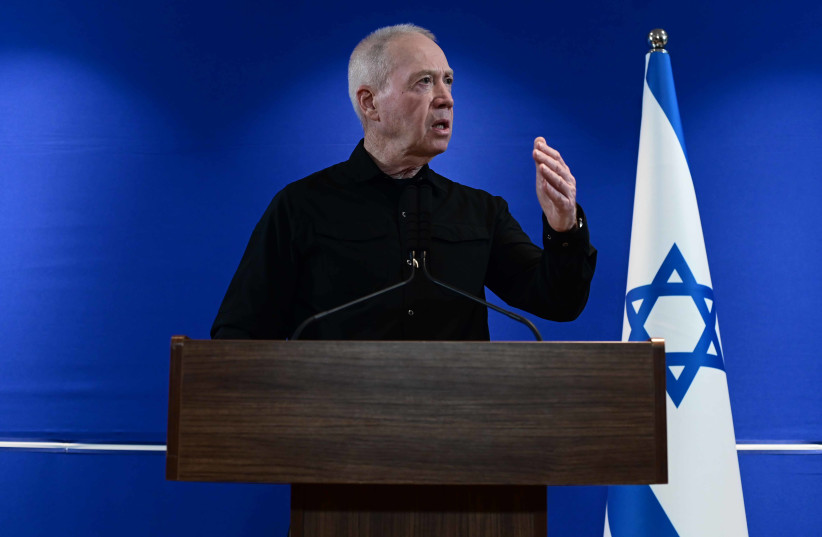Defense Minister Yoav Gallant on Saturday night said that a deal with the US about what Stage 3 of the Gaza war would look like “was crucial” to all security fronts that Israel was facing.
He made his statement just before he took off to Washington on Saturday night to meet with top American foreign policy and defense officials from Sunday to Tuesday, amid a new crisis that erupted between Prime Minister Benjamin Netanyahu and US President Joe Biden.
In the balance are both the southern and northern fronts.
More specifically, there is the future of the war and post-war Gaza policy, including the issue of the hostages, efforts to avoid war with Hezbollah, the status of weapons sales in a range of areas, Iran policy, and related regional issues.
Due to Netanyahu’s testy relations with Biden and the absence of a fully empowered Israeli foreign minister, Gallant has often been the number-two critical interlocutor between the countries.

In that context, Gallant said stable relations with the US were maybe “more important now than at any point in [Israeli] history.”
Earlier this week, Netanyahu attacked the Biden administration for delaying weapons sales, and then, on Wednesday, one of his spokespeople said he had restored American weapons sales.
Netanyahu was referring to Biden’s May public statement that Israel was holding up a shipment of large bombs to prevent Jerusalem from using them in an attack on Rafah.
Netanyahu blamed for aggravating crisis
However, sources close to Gallant, as well as in the IDF and the defense establishment, have blamed Netanyahu for aggravating the weapons crisis rather than navigating it cleverly and quietly, especially since the IDF is so close to taking over Rafah without having significantly upset the US with its conduct of the battle.
During his most recent Washington trip on March 25-26, he met with Secretary of Defense Lloyd Austin, Secretary of State Antony Blinken, and multiple times with National Security Advisor Jake Sullivan. He is expected to meet these officials again as well as CIA Director Bill Burns and envoy for the Lebanon crisis Amos Hochstein.
In the past, some of those meetings were planned, but others were added after a similar crisis between Netanyahu and Biden in March, when each side canceled various meetings. Gallant ended up bridging some of the gaps at the time.
Some speculated that Netanyahu went after Biden earlier in the week to declare that he had solved the weapons crisis on Wednesday, before Gallant was set to arrive in the US, so that the prime minister could take credit.
Instead, a mix of US and Israeli sources seemed unclear about whether Netanyahu’s latest attack on Biden had led the US to pause the approval process for Israel to purchase F-15EX aircraft.
Israel had already delayed that process twice: the first time because of many rounds of elections and the second time, more recently, due to disputes between Gallant and Finance Minister Bezalel Smotrich. Smotrich sought additional oversight, and the defense establishment viewed his intervention as an attempt to politicize national security.
Gallant on Saturday night said he would seek to restore and preserve “Israel’s qualitative edge in the Middle East” regarding weaponry versus its adversaries.
Israel and the US have wrestled over whether the IDF should invade Rafah and, if so, how to conduct the invasion, considering the number of Palestinian civilians killed, the general humanitarian situation in Gaza, Netanyahu’s refusal to propose a day-after solution for running Gaza, and whether US weapons support should be conditional on Israel following certain American policy recommendations.
Along with a variety of senior aides, Defense Ministry Director-General Maj.-Gen. (res.) Eyal Zamir is also flying with Gallant.
Zamir is not only significant as the number two official in the Defense Ministry. He is also rumored to be the lead candidate to replace IDF Chief of Staff Lt.-Gen. Herzi Halevi, who is expected to resign at some point over the failure to prevent Hamas’s October 7 invasion.
This means that if Zamir agrees with promises that Gallant makes to the US about how it will or will not use American weapons, that promise could go years past when Gallant may no longer be defense minister.
